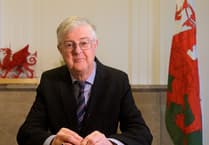I’ve never been persuaded that we are simply biological accidents. In fact I can’t see how anyone could imagine our bodies are anything but ‘designer made’.
The ancient Israelite king David knew nothing of DNA or chromosomes, but he understood enough biology to recognise that we are all ‘fearfully and wonderfully made’, woven together like a wonderful tapestry in our mother’s womb. In saying this David was underlining the importance of an unborn child when he wrote ‘You watched me as I was being formed in utter seclusion, as I was woven together in the dark of the womb’. Even before his own mother was aware of his existence then, David knew that God was taking a loving interest in him.
Given all this you will appreciate why I am convinced that we are not disposable commodities either. Yes, I do believe in a woman’s right to choose but as I see it that should be between keeping the child or placing it for adoption, except in the case of a medical emergency of course. When we adopt this position we are defending the rights of both the mother and the unborn child. This is not a popular stance of course. I appreciate that. But I have no option given the way the Bible talks about the status of an unborn child. Thankfully I am not alone which is why I was so encouraged to read of a pro-life advocate who can address this issue with far more authority that I ever can. I say with for more authority than me because she knows what it is to be aborted!
Melissa Ohden is a remarkable lady. A mother of two herself now, she was aborted in 1977 but her tiny body (weighing just 3lb) was discovered among medical waste in the hospital where the abortion had taken place. She wasn’t aware of it at the time of course. In fact she didn’t discover the truth until she was 14.
I can’t begin to imagine how I would react if I was told that I was only alive because of a botched abortion. I guess we can all feel pretty worthless at times, but Melissa Ohden’s experience is in a different league altogether. That’s why she can prove such a good role model for those who feel a waste of space or life has treated them so badly.
Coming to terms with it didn’t come easily of course. She struggled with alcohol problems and an eating disorder but in addition to gaining a master’s degree, getting married and starting a career in social work Melissa made contact with her birth parents to hear their side of the story. Sadly, her dad showed no interest in her when she reached out to him, but she finally ended up meeting her birth mother in 2016, something she attributes to God Himself as we can see from this quotation I found in Premier Magazine: ‘The woman who carried me is a significant part of my life again; a miracle only God could have orchestrated. I don’t see God’s fingerprints on my life. I see his handprints. I never could have imagined the life I live now’.
Melissa now spends her time advocating for the unborn, a voice of hope for abortion survivors as well as seeking to build bridges with those who hold different opinions, but whatever we think of her stance on abortion I reckon none of us can doubt that she has discovered what Jesus meant when He talked of ‘living life to the full’. But isn’t that typical of God? Who else would choose to use an aborted foetus to ‘bring hope in the most unexpected places’?


